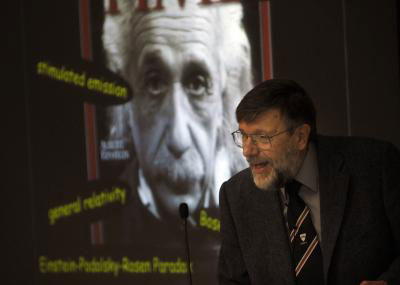| Posted: May 22, 2009 |
Nobel Laureate underscores importance of investment in basic research |
|
(Nanowerk News) Dr. William Phillips, an Office of Naval Research (ONR) funded Nobel Prize-winning physicist, delivered the final lecture at ONR's spring distinguished lecture series May 19. Phillips' compelling presentation, titled "Time, Einstein and the Coolest Stuff," highlighted the importance of basic research and ONR's legacy of support for innovative scientists.
|
|
Among the attendees at Phillips' lecture were Dr. Delores M. Etter, former Assistant Secretary of the Navy for Research, Development and Acquisition, and Rear Admiral Nevin P. Carr, Jr., Chief of Naval Research.
|
 |
| Nobel Prize in physics recipient Dr. William D. Phillips from the National Institute of Standards and Technology (NIST) tells US Office of Naval Research employees about his work as a leading researcher in laser cooling and trapping of atoms during the Director of Innovation's distinguished lecture series. These fundamental studies are used to develop applications for new kinds of physics measurements and processes such as high resolution spectroscopy, atomic clocks, atomic collisions, atom optics, bio-molecular interactions, and atomic-scale and nano-scale fabrication. (Image: John F. Williams)
|
|
"Dr. Phillips' Nobel Prize-winning work is an excellent example of the type of investments ONR makes in basic research," noted Etter, who now serves as Director of the Caruth Institute for Engineering Education at Southern Methodist University. "In particular, his achievements punctuate the vital importance of a long-term approach to developing future science and technologies (S&T) that are based upon solid fundamental research."
|
|
Dr. Phillips is a pioneer and leading researcher in laser cooling and trapping of atoms at the National Institute of Standards and Technology. His fundamental studies were used to develop applications for new kinds of physics measurements and processes such as high resolution spectroscopy, atomic clocks, atomic collisions, atom optics, bio-molecular interactions, and atomic-scale and nano-scale fabrication.
|
|
Phillips asserted, "ONR is different among the federal S&T organizations because it gives science a chance. A program officer with vision can say 'I think this is a great idea and I'm going to fund it.' The recognition of the importance of basic research in support of mission goals can lead to mission success where a more tightly focused vision might not." He summed it up by saying, "ONR's style has intrinsic and high value."
|
|
Ultimately, Phillips and two colleagues were awarded the 1997 Nobel Prize in physics. His work has yielded many relevant naval applications, in particular precision timekeeping, navigation and quantum information, including unbreakable encryption.
|
|
|
| "Dr. Phillips and his colleagues were the first to clearly slow down atomic motion with light, and the first to construct a trap for neutral atoms. Both of these pioneering accomplishments were made possible with support from the Office of Naval Research, which was given at early stages of his scientific career," said Dr. Charles W. Clark, ONR's Atomic and Molecular Physics program manager, who has funded some of Phillips' more recent research.
|
|
Since 1946, ONR has funded the world's premier engineers, physicists, mathematicians, oceanographers, meteorologists and thousands of other scientists as they conduct revolutionary research in support of U.S. forces and allies. These investments in discovery and invention (D&I), innovative naval prototypes (INP) and future naval capabilities (FNC) have yielded a myriad of state-of-the-art technologies over the long-term.
|
|
"The ability of ONR to be able to support high risk, long term research efforts without requiring external peer review enabled the breakthroughs by Dr. Phillips that created a whole new field of research," noted Dr. Bobby Junker, head of ONR's Command, Control Communications, Computers, Intelligence, Surveillance, and Reconnaissance (C4ISR) department. In November 1979, Junker was the ONR program officer who initiated funding for Phillips' research on laser cooling and trapping of neutral atoms.
|

